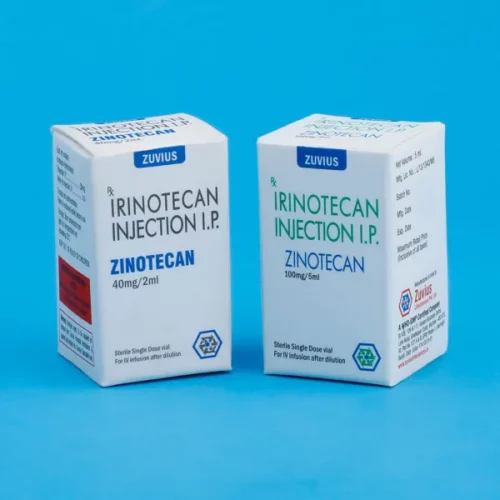Lenvitib Cap- Lenvatinib Cap
Lenvatinib Cap
Strength: 4mg / 10mg
Pack Size: 1 x 10
Drug Class: Antineoplastics, VEGF Inhibitor
Dosage and Administration:
Important Dosage Information
- Reduce the dose for certain patients with renal or hepatic impairment [see DOSAGE AND ADMINISTRATION].
- Take Lenvatinib once daily, with or without food, at the same time each day . If a dose is missed and cannot be taken within 12 hours, skip that dose and take the next dose at the usual time of administration.
Recommended Dosage For Differentiated Thyroid Cancer (DTC)
The recommended dosage of Lenvatinib is 24 mg orally once daily until disease progression or until unacceptable toxicity.
Recommended Dosage For Renal Cell Carcinoma (RCC)
First-Line Treatment Of Patients With Advanced RCC
The recommended dosage of LENVIMA is 20 mg orally once daily in combination with pembrolizumab 200 mg administered as an intravenous infusion over 30 minutes every 3 weeks until disease progression or until unacceptable toxicity or up to 2 years. After completing 2 years of combination therapy, LENVIMA may be administered as a single agent until disease progression or until unacceptable toxicity.
Refer to the pembrolizumab prescribing information for other pembrolizumab dosing information.
Previously Treated RCC
The recommended dosage of Lenvatinib is 18 mg in combination with 5 mg everolimus orally once daily until disease progression or until unacceptable toxicity.
Refer to the everolimus prescribing information for recommended everolimus dosing information.
Cold Storage: no
a kinase inhibitor, is the mesylate salt of lenvatinib. Its chemical name is 4-[3- chloro-4-(N’-cyclopropylureido)phenoxy]-7-methoxyquinoline-6-carboxamide methanesulfonate. The molecular formula is C21H19ClN4O4 • CH4O3S, and the molecular weight of the mesylate salt is 522.96. The chemical structure of lenvatinib mesylate is:
 |
Lenvatinib mesylate is a white to pale reddish yellow powder. It is slightly soluble in water and practically insoluble in ethanol (dehydrated). The dissociation constant (pKa value) of lenvatinib mesylate is 5.05 at 25°C. The partition coefficient (log P value) is 3.3.
LENVIMA capsules for oral administration contain 4 mg or 10 mg of lenvatinib, equivalent to 4.90 mg or 12.25 mg of lenvatinib mesylate, respectively. Following are inactive ingredients: Calcium Carbonate, USP; Mannitol, USP; Microcrystalline Cellulose, NF; Hydroxypropyl Cellulose, NF; Low-substituted Hydroxypropyl Cellulose, NF; and Talc, USP. The hypromellose capsule shell contains titanium dioxide, ferric oxide yellow, and ferric oxide red. The printing ink contains shellac, black iron oxide, potassium hydroxide, and propylene glycol.
Differentiated Thyroid Cancer
Lenvatinib is indicated for the treatment of patients with locally recurrent or metastatic, progressive, radioactive iodine-refractory differentiated thyroid cancer (DTC).
Renal Cell Carcinoma
Lenvatinib in combination with pembrolizumab, is indicated for the first-line treatment of adult patients with advanced renal cell carcinoma (RCC).
Lenvatinib in combination with everolimus, is indicated for the treatment of adult patients with advanced RCC following one prior anti-angiogenic therapy.
Usage-:
The main efficacy outcome measure was progression-free survival (PFS) as determined by blinded independent radiologic review using Response Evaluation Criteria in Solid Tumours (RECIST)
. Secondary efficacy outcome measures included overall response rate and overall survival. Patients in the placebo arm could opt to receive lenvatinib treatment at the time of confirmed disease progression.
The clinical efficacy and safety of lenvatinib have been evaluated in an international, multicenter, open-label, randomised phase 3 study (REFLECT) in patients with unresectable hepatocellular carcinoma (HCC).
The efficacy of lenvatinib in combination with pembrolizumab was investigated in Study 309, a randomised, multicentre, open-label, active-controlled study conducted in patients with advanced EC who had been previously treated with at least one prior platinum-based chemotherapy regimen in any setting, including in the neoadjuvant and adjuvant settings
you are allergic to lenvatinib or any of the other ingredients of this medicine
you are breast-feeding
Hypertension
Hypertension occurred in 73% of patients in SELECT (DTC) receiving LENVIMA 24 mg orally once daily and in 45% of patients in REFLECT (HCC) receiving LENVIMA 8 mg or 12 mg orally once daily. The median time to onset of new or worsening hypertension was 16 days in SELECT and 26 days in REFLECT. Grade 3 hypertension occurred in 44% of patients in SELECT and in 24% in REFLECT. Grade 4 hypertension occurred <1% in SELECT and Grade 4 hypertension was not reported in REFLECT.
Cardiac Dysfunction
Serious and fatal cardiac dysfunction can occur with LENVIMA. Across clinical trials in 799 patients with DTC, RCC or HCC, Grade 3 or higher cardiac dysfunction (including cardiomyopathy, left or right ventricular dysfunction, congestive heart failure, cardiac failure, ventricular hypokinesia, or decrease in left or right ventricular ejection fraction of more than 20% from baseline) occurred in 3% of LENVIMA-treated patients.
Monitor patients for clinical symptoms or signs of cardiac dysfunction. Withhold and resume at a reduced dose upon recovery or permanently discontinue LENVIMA based on severity










